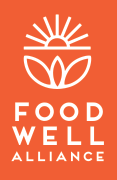Strategies to Increase Sustainable Compost Production for Metro Atlanta's Urban Farms and Community Gardens
Food Well Alliance believes healthy soil is essential to ensure our city’s urban farmers and community gardeners can grow more sustainable, healthy food.
Wasted food is important to producing healthy soil because 52.4 million tons of food residuals and wasted food is sent to landfills annually, while close to 40% of the landfills in Metro Atlanta are filled with wasted food. This wasted food could be diverted as feedstock in the production of community-based compost and used locally by urban growers to produce more local food.
Since 2015, Food Well Alliance has been collaborating with local food movement leaders to support healthy soil practices and divert food waste to increase the production of compost.
We brought together a diverse group of public, private, and nonprofit leaders for the Community-based Composting Working Table who identified 78 challenges, 62 opportunities, and reached consensus on 9 strategic recommendations to increase community-based composting in Metro Atlanta.
We are now sharing these findings through our latest white paper entitled Closing the Loop, Food Waste in Atlanta: Strategies to Increase Sustainable Compost Production for Metro Atlanta’s Urban Farms and Community Gardens.
Compost White Paper key findings include:
Locally Produced Compost Demand is Strong and Growing
Georgia’s Compost Industry Needs the Right Regulatory Climate
Feedstock Contamination is a Safety Issue and an Economic Issue
The Social Enterprise Model is an Attractive Solution to Increase Community-based Composting
We hope that you share your thoughts with us on the white paper’s sections and ideas that spark your curiosity.
A special thanks to all of the Community-Based Composting Working Table Members:
Atlanta Community Food Bank; Mercedes-Benz Stadium; City of Atlanta, Mayor’s Office of Sustainability; NatureWorks LLC; City of Atlanta, Department of Watershed Management; Choose Goodness; Compostwheels; The Georgia Recycling Coalition; The Georgia Restaurant Association; Georgia Institute of Technology; Republic Services; Southern Green Industries; Terra Nova Compost; Truly Living Well Center for Urban Agriculture; United States Environmental; Protection Agency, Region 4.





